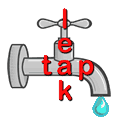 |
Homophones are words that sound the same but have different spellings and different meanings, for example: |
 |
 |
| meat | meet |
These words are called homophones from the Greek words homo (meaning same) and phonos (meaning sound). Some other examples:
| die / dye | flair / flare | hole / whole | paws / pause | threw / through |
Sometimes it is hard to remember which spelling to use because
So how can you remember which word is which? Try inventing a mnemonic to help fix the correct word in your memory. For example:
1. Link the words with others that you know:
|
hear - with your ears here - a place |
Did you hear that strange
noise? Don't put it here, put it over there. |
|||
|
||||
2. Look at the letter that is different. Think
of a link that helps you remember the meaning. Draw pictures and write
the words in a cross, like this:
 |
 |
|
leek - vegetable leak - let out liquid |
Leeks taste a bit like onions. The broken tap is leaking. |
|||
|
||||
|
current - 1) flow of eg. water 2) ongoing, in use currant - small dried grape |
1) The river had a strong current. 2) Read about current events in the paper. This cake is full of currants. |
|||||
|
||||||
3. Look for small words within the main word:
|
peace - opposite of war piece - part, section |
If the baby is asleep there is peace and quiet. Don't eat it all, leave me a piece. |
|||
|
||||
In each of the examples above, you had to target the letters that were
different and think of a way to remember which word had which meaning.
Your turn now. Look at these two words:
 |
 |
| beech - a tree | beach - sand by the sea |
Imagine you want to teach someone which word is which.
How would you do it? To see if you are thinking of the same mnemonic as
the author, click
here.
Each section of the Spellzone program targets one
sound and finishes with homophones for that sound. In many cases, ideas
for mnemonics are given, to help you remember which word is which.
To see some more examples, click
here.
 |
Finally - Don't be embarrassed about being a poor speller! Some of the most intelligent, creative and talented people have been dreadful spellers. |
These tips will have given you a 'taster' of what the 'Spellzone' resource can offer. For access to hundreds of pages of teaching tips, spelling rules, games and spelling activities, register here.
One of the students has put in a huge amount of effort in completing Spellzone at least 3 times a week since his arrival with us in January. Looking at his scores after the latest GL testing, his standardised score has risen from 99 to 131. This is a truly phenomenal result. I just wanted to share the best result I have ever seen.
Terrie Penrose-Toms, Casterton College